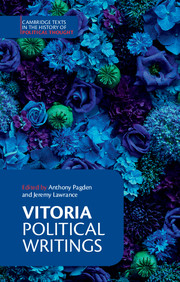Book contents
- Frontmatter
- Contents
- Dedication
- Editors' note
- Abbreviations and sigla
- Introduction
- Principal events in Vitoria's life
- Bibliographical note
- Critical note on texts and translation
- TEXTS
- 1 On Civil Power
- 2 I On the Power of the Church
- 3 II On the Power of the Church
- 4 On Law: Lectures on ST I-II. 90-105
- 5 On Dietary Laws, or Self-Restraint (extract)
- 6 On the American Indians
- 7 On the Law of War
- APPENDICES
- Biographical notes
- Glossary
- List of references
- Index
- Cambridge Texts in the History of Political Thought
2 - I On the Power of the Church
Published online by Cambridge University Press: 05 June 2012
- Frontmatter
- Contents
- Dedication
- Editors' note
- Abbreviations and sigla
- Introduction
- Principal events in Vitoria's life
- Bibliographical note
- Critical note on texts and translation
- TEXTS
- 1 On Civil Power
- 2 I On the Power of the Church
- 3 II On the Power of the Church
- 4 On Law: Lectures on ST I-II. 90-105
- 5 On Dietary Laws, or Self-Restraint (extract)
- 6 On the American Indians
- 7 On the Law of War
- APPENDICES
- Biographical notes
- Glossary
- List of references
- Index
- Cambridge Texts in the History of Political Thought
Summary
This first of the two relections on the power of the Church was delivered early in 1532, and was followed a year later by the second.
The text of this relection in P omits some quotations and words in Greek at the start and various references to authorities, as well as introducing a number of minor corruptions, chiefly by careless copying; these corrupt passages in P have been mended from L (the variants are duly indicated in the footnotes). P's invaluable division of the text has also on this occasion been partly preserved in the printed editions, which retain the headings of the six questions, though not the separate articles. We have taken advantage of this fact to correct P's scribal error in the numbering of Questions 4, 5, and 6 (see footnotes 40, 46, and 68).
RELECTION I ON THE POWER OF THE CHURCH BY THE CELEBRATED REVEREND FATHER FR. FRANCISCO DE VITORIA, MASTER OF THEOLOGY, DELIVERED IN SALAMANCA, A.D. 1532
[Introduction: Definition of the term church]
§1 My intention today is to talk about the power of the Church. I must therefore start with a few remarks about the term ‘church’ (ecclesia), so as to make clear what it is we are talking about.
The original Greek term ekklesia is a noun meaning ‘council, meeting, assembly’, and also ‘the place where such a meeting takes place’. So it is understood by Lucian in his Dialogue of Mercury and Maia; and from it are derived ekklesiazo, ‘to convene or address an assembly’, and ekklesiastes, ‘one who addresses an assembly, preacher’.
- Type
- Chapter
- Information
- Vitoria: Political Writings , pp. 45 - 108Publisher: Cambridge University PressPrint publication year: 1991



